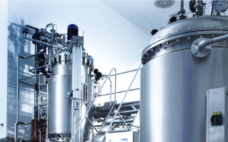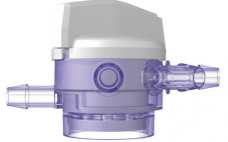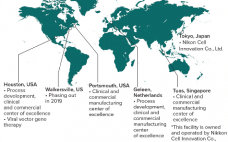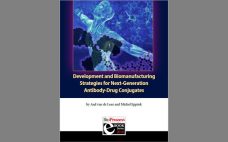Richter-Helm is a Hamburg, Germany–based contract manufacturing company with a proven 30-year track record and specialized in products derived from bacteria and yeasts. Count on us to flexibly provide a comprehensive range of services and customized solutions. Clients worldwide already have benefited from our commitment to good manufacturing practice (GMP) and total transparency. Our work focuses on recombinant proteins, plasmid DNA, antibody fragments, and vaccines. Our seasoned, 240-strong team supports you with process development, supply of products for clinical trials,…
2018
CYLINDRAFlow™ Manifolds: A New Offer That Simplifies Processing Applications
Nordson MEDICAL has launched a new manifold that makes assembly and operation simpler compared with products currently used in the biopharmaceutical industry. This patent-pending product was announced at ACHEMA in Frankfurt, Germany, in 2018. Simplicity is the main benefit of the design and user interface built into CYLINDRAFlow™ manifolds. There is a one-to-one relationship between the inlet port and the five available outlet ports. The large, easy-to-use knob with clearly marked arrows provides a visual indication of which outlet port…
The Next Milestone in Cell and Gene Therapy
The field of cell and gene therapy is transforming the way patients who are diagnosed with cancers or genetic diseases can be treated. Today, the cost of producing these therapies still represents a major hurdle on the way to the commercialization. New technologies are needed that enable robust and cost-efficient manufacturing and yield replicable high-quality medicines. Although the therapeutic opportunities for patients are exciting, the stakes for patients and drug developers are high. We want to be your partner, add…
The Microbial CDMO: Process Development and Manufacturing of Biologics
Wacker Biotech is “The Microbial CMO” — the partner of choice for process development and contract manufacturing of biopharmaceuticals (proteins, vaccines, and live microbial products) using microbial hosts. WACKER’s integrated service portfolio covers molecular biology, process/analytical development, and good manufacturing practice (GMP) manufacturing of biologics for clinical and commercial supply. WACKER operates three state-of-the-art GMP facilities located in Europe (Germany and The Netherlands). Manufacturing lines with two 300-L and two 1,500-L stainless steel fermentation vessels, single-use fermentation lines, matching downstream…
Messenger RNA Drugs: Engaging the Machinery of Patients’ Cells to Therapeutic Effect
Although most of the bioprocess industry has focused on process development for large-molecule formulations (e.g., protein drugs), a growing segment of the industry has been concentrated on other types of biotherapeutics to leverage advances in understanding of immunology and genetic engineering. Such technologies may emerge both as tools for drug manufacturing and at some point, as biopharmaceuticals, biotherapeutics, vaccines, and cell and gene therapies,  themselves. What brings mRNA research to BioProcess International’s attention is the increasing interest turned toward therapeutic…
Development and Biomanufacturing Strategies for Next-Generation Antibody-Drug Conjugates
The development and manufacture of antibody-drug conjugates (ADCs) requires a series of complex steps. ADC manufacturers must comply with guidelines for both the small-molecule linker-drug and the monoclonal antibody (MAb). The authors describe their company’s development of its lead ADC product. They review process decisions, including the issues that factored into their selection of single-use systems, manufacturing challenges (differences between ADCs and MAbs), and testing methodologies for extractables and leachables. Synthon began as a small-molecule generics company in 1991. During…
Introduction: The Ins and Outs of Market Demand
From transport and holding of bulk drug substance to shipping, warehousing, tracking, and distribution of final packaged drug products, biopharmaceutical supply chain logistics can be described as an industry in itself. And that’s just one side of the story. Even though much of the work of establishing and maintaining supply chains might happen outside the manufacturing environment, all organizations that develop processes and final products depend on having the raw materials and available components and resources to do their work.…
Standardizing Human MSCs As Critical Raw Materials in Cell Therapy Products: Streamlining Clinical Translation
Advancements in cell therapy, biofabrication, and synthetic biology have driven the growth of the global regenerative medicine (RegenMed) industry in the past decade. The industry has developed innovative treatment options for patients with otherwise unmet medical needs (1). Human or animal cells or tissues are used as critical raw materials in cell therapy products that can replace, regenerate, or augment patients’ diseased, dysfunctional, or injured cells, tissues, or organs. These cells or tissues can be unmanipulated, or their biological characteristics…
Spray Freeze-Drying Technology: Enabling Flexibility of Supply Chain and Drug-Product Presentation for Biologics
Biopharmaceutical drug substances (DSs) and drug products (DPs) commonly are stored frozen or refrigerated to maintain stability through long-term storage, handling, and transportation (1). Temperature excursions during storage and transport can affect product quality adversely by compromising the safety and efficacy of these molecules. Thus, cold-chain management throughout the shelf life of these products is a critical component in the supply chain strategy for them. The cost and complexity of cold-chain management is a well-known challenge faced by the biopharmaceutical…
November From the Editor
The word innovation carries with it connotations of both newness and change. Funny thing about that: Changing conditions require adaptation and originality in response to them — which often causes more change that will in turn require further innovation in response. In an industry based on science, this can (and should) be a neverending cycle either of playing catch-up — or of continually pushing the envelope. We hear a lot of talk about innovation in the biopharmaceutical industry these days.…










